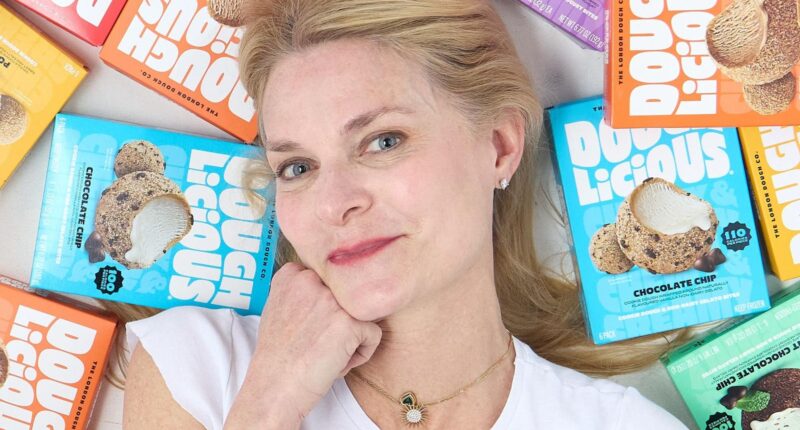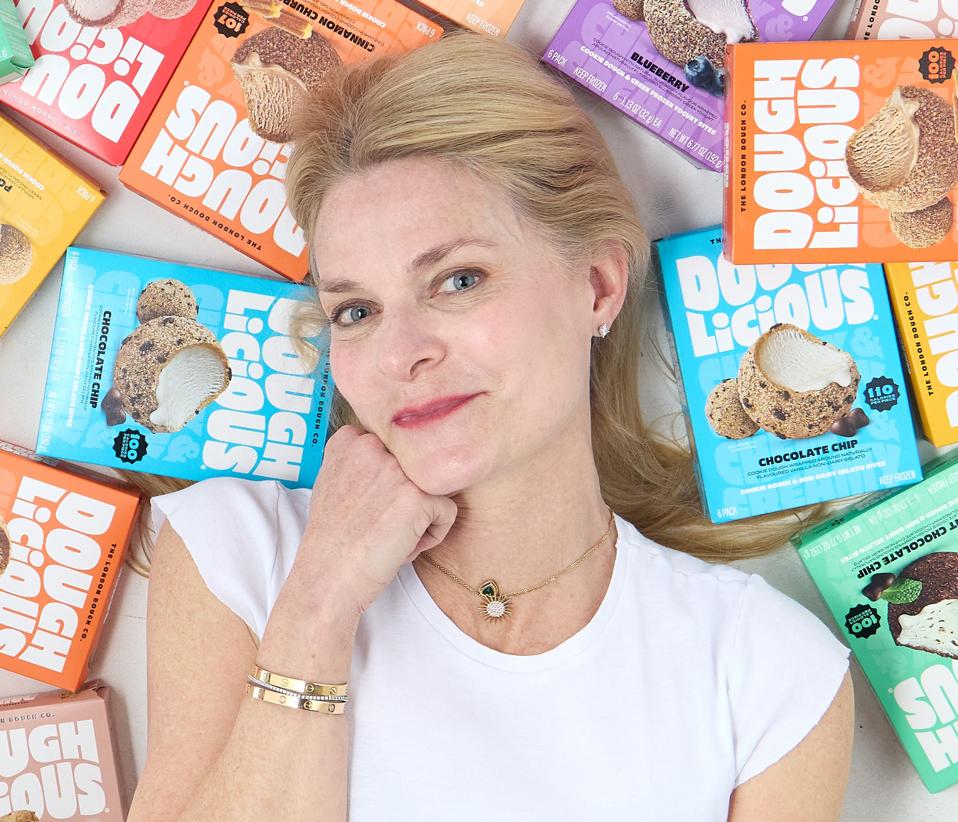Share this @internewscast.com
For founders of British consumer brands, one particular dread looms large: the prospect of entering the US market only to fail. This fear is not without basis. The sheer scale of the US market, with its vast distances and significant retail expenditures, poses formidable challenges. Established competitors dominate the scene with louder voices, and the hidden expenses associated with maintaining a shelf presence—such as trade spend, shopper promotions, demonstrations, logistics, freight, and the maintenance of cold chain logistics—often eclipse any anticipated gains.
For entrepreneurs lacking flexible financial backing, venturing into the US market can be risky enough to jeopardize their careers. However, Kathryn Bricken, the founder of Doughlicious, defies this narrative. Originally from Florida but now based in London, Bricken leads a thriving cookie dough snack brand valued at over £10 million ($13 million). Her ambitious plans include expanding into 5,000 US retail locations.
Bricken launched Doughlicious in 2017 from her kitchen in Fulham, drawing on her skills as a self-taught baker. Today, she oversees a team of 50 employees across the UK and the US, with a production rate exceeding one million cookie dough and gelato bites each week.
While the brand’s growth is certainly notable, the strategy behind it is even more remarkable. Bricken’s journey exemplifies the strength of vertically integrated production in the competitive consumer packaged goods (CPG) industry. She consistently prioritized product quality, refusing to compromise even when scaling up. Faced with manufacturers unable to replicate the home-made consistency and texture she demanded, Bricken chose to build her own production facility rather than lower her standards or alter her recipes for mass production.
Bricken founded the company in 2017 out of her Fulham kitchen as a self-taught baker. Today, she leads a 50-person team across the UK and US, producing more than one million cookie dough and gelato bites every week.
But while the scale is impressive, the way she did it is the real story.
Doughlicious cookie dough
Doughlicious
A case study in the power of vertically controlled production in challenger CPG, Bricken refused to compromise on product quality at every turn. No manufacturer could match the consistency and texture she was getting at home, so instead of lowering the bar or reformulating for scale, she built her own factory.
“That was the hardest part,” she says. “I’m not only growing a brand – I’m running a factory. But I wouldn’t trade it. I feel better knowing we are giving customers the best.”
Counter-intuitive as the investment or added stress may seem, that factory is now the reason they can respond to trends faster, trial flavours at pace, and protect quality in a category where ultra-processed, high-volume incumbents dominate on price.
And the positioning of her brand is just as unlikely. Against market trends, Doughlicious didn’t create a “healthier cookie dough” for the mass market, but premium, indulgent, “better ingredients” snack that doesn’t apologise for costing more.
“The high-volume competitors are using price to drive awareness,” Bricken says. “Our job is to win trial. Once people taste the difference, they understand the value.”
And the numbers suggest she’s right. Doughlicious products are now in 1,850 UK stores including Tesco, Morrisons, Ocado, et al. In the US, they are in 220 retailers including Target and Whole Foods, with a pipeline aiming at 5,000 US retail doors by the end of 2025. The brand has also picked up 20+ Great Taste Awards, a Nexty Award and a Mintel Innovation Award along the way.
Quite frankly, Bricken has nailed her brand positioning. And is unusually articulate on its narrative—not surprising, in the end, given a background producing West End shows like Jersey Boys, Anything Goes, Cabaret, and Rocky Horror.
“At its core, theatre is storytelling, and so is branding,” she says. “We’re not just selling cookie dough. We’re creating moments of joy and nostalgia. We’re tapping into memories of baking with loved ones, the anticipation of warm cookies from the oven, the indulgence of sneaking a bite of raw dough.”
It isn’t just rhetoric, either. The health credentials—gluten-free, no refined sugar, no artificial additives—are there, but they are supporting cast members, not the lead.
This is arguably the post-Ultra-Processed playbook; indulgence as a premium experience with standards, not as a chemically optimised impulse buy.
Doughlicious founder Kathryn Bricken
Doughlicious
Of course, Doughlicious’ US expansion still comes with its challenges. “What works in the UK doesn’t translate,” Bricken says. “The US is five times larger. The media spend, the sampling programs, the shopper marketing—everything costs significantly more to achieve the same level of penetration.”
And then there’s logistics. In the UK, a frozen product can realistically reach the majority of the country within a single distribution centre in a single time zone. In the US, it can take multiple distribution hubs, long-haul cold chain experts, and significantly more sophisticated logistics to protect product quality and availability alone.
This is the part most outsiders underestimate. Shelf space is expensive to win, but even more expensive to keep.
Thankfully, Bricken’s team has had strategic help from experienced capital. The Bata Family Office Triple B supported early. Rich Products Ventures—Doughlicious’ first US investors—are unlocking the foodservice insights and doors that take most small UK snack brands years to access. The Angel Group brings pattern recognition from other CPG scale stories.
“These aren’t passive investors,” Bricken says. “They challenge my thinking and help me make better decisions,” she says.
“Resilience is key. Being a woman founder sadly means you often have to work harder to be taken seriously, to prove your credibility, and to access the same networks and capital that seem more readily available to male founders.
“My advice: hold firm to your vision, never compromise on what you believe in but stay flexible in how you get there.”
Doughlicious cookie dough
Doughlicious
She’s extremely straightforward about hating management as a concept, but understands culture as the lever. “I’m very involved as a founder,” she says. “I don’t have an office. I hotspot and move around. My favourite part of the business is still product development and quality. But I’ve learned to focus on creating a culture that attracts smart, motivated people who are as passionate about growing Doughlicious as I am.”
There’s also life context. She was diagnosed with breast cancer in 2019 and kept working through surgery and radiotherapy. She isn’t romantic about it, but incredibly clear. “When you’ve faced something as frightening as cancer, you stop sweating the small stuff and become laser-focused on what’s actually important.”
As a result, Bricken’s success isn’t abstract. Or typical. She was a self-taught baker, with no employees and no manufacturing partner, yet backed herself so fiercely on quality that she built an entire factory to protect it and cracked America in under a decade.
The next phase? Global doughmination.






